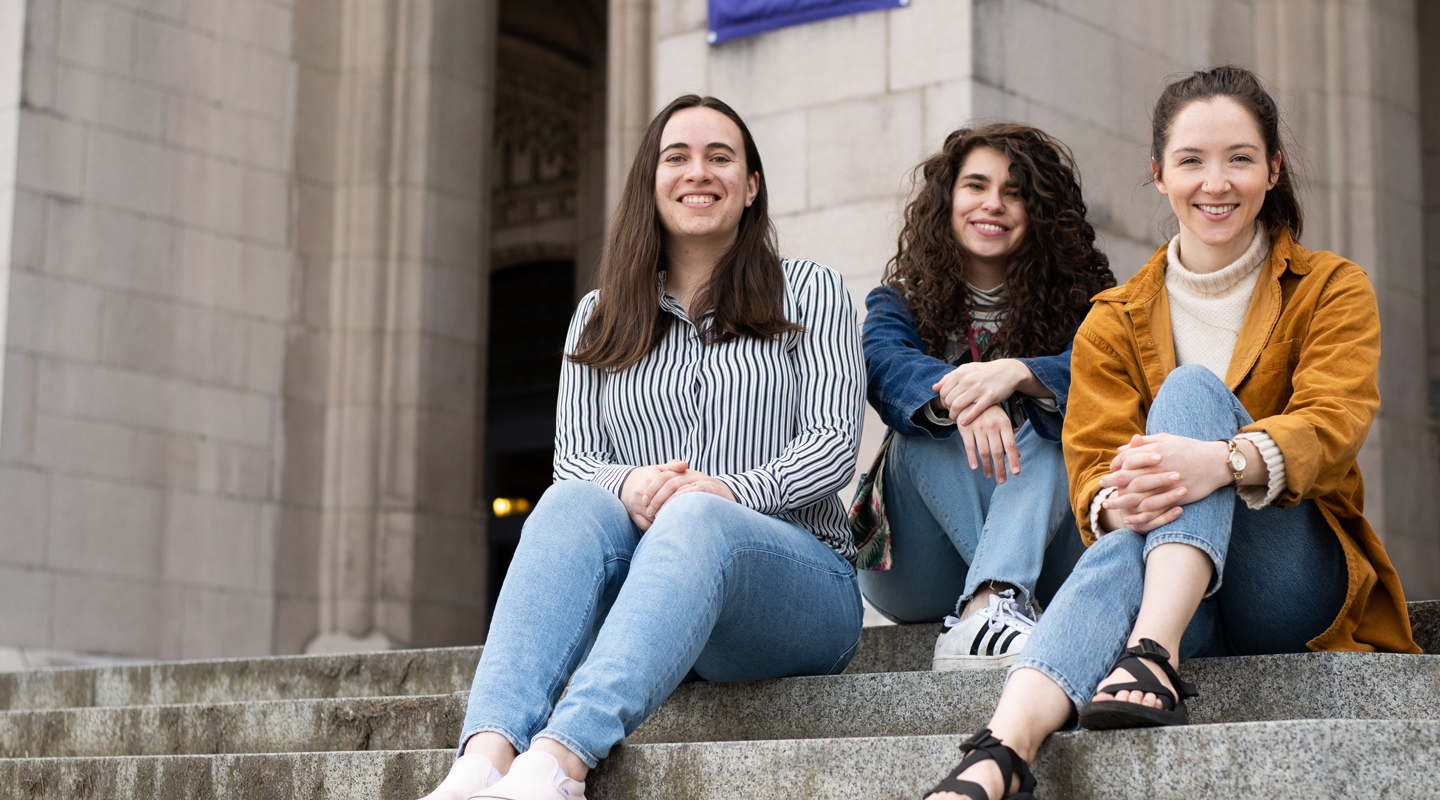The three iSchool students were nervous their first day working with Compass Housing Alliance youth. They went in with only a skeletal program itinerary, a bunch of name tags and craft supplies, and a powerful idea. They would use participatory design methods learned in graduate MLIS studies to help these youth co-create a storytelling program.
They’d take their cues from the kids, use their input to shape each step, and put democracy to work in the community room at the housing complex, which serves people who are low-income or experiencing homelessness. “Our goal was to empower a marginalized group through creativity and creation,” says Sydney Geyer (at right, above), who teamed with Sydney Powell (center) and Ellen Barker on the “Liberating Literature” Capstone project.
Day 1 was a mess. It started late, ended early. The Master of Library and Information Science students ran out of activities. Chaos reigned. “It was like, ‘Let’s throw some spaghetti at the wall and see what sticks,’” says Geyer.
Despite the chaos, the kids got it. This program was theirs. They owned it. That first day, the young co-designers told the UW team they wanted to work with comics, anime and manga — not the poetry the team had planned to use. And they wanted snacks, lots of snacks. “It was really surprising to me, even on the first day, how immediately almost all the kids were like ‘This is what we want, this is how we want it, and we will respond really positively when you install these things that we think are important,’ ” says Geyer.
The iSchool team assured the youth, some first-generation immigrants and all children of color, that this would not be like school, where rules are made up by an external authority and you’re supposed to follow them without question. The participants would make up their own rules to guide group behavior. “This is a community that often doesn’t have the opportunity to take this level of control,” says Geyer. “It was exciting to see.”
The iSchool team was quick to improvise at every turn in their week of two-hour sessions. When one student said he didn’t know what to write about, that he had nothing to say, a team member told him, “Write about that.” And he did, a provocative poem about having nothing to write about.
Armed with comic books and graphic novels, boxes of Cutie tangerines and Capri Suns, the iSchool students introduced art prompts, writing prompts and art projects based on the kids’ constant feedback, elicited through surveys and thumbs-up, thumbs-down interaction. “We’d say, OK, you didn’t like this activity, it was boring. What do you think would be more interesting?” says Geyer.
The eight participants, grade-schoolers to middle-schoolers, made comic characters from collage materials and — after requesting an outdoor session — sticks, rocks and plant material. “They came up with some crazy pieces of modern art,” says Barker, who is putting together a book featuring participants’ writing and artwork. “One of the youngest cut out Martha Stewart’s head and pasted it on top of a tall skyscraper. She captioned it, ‘This is my body.’ ”
The youth were open and frank, willing to expose vulnerabilities. On a prompt asking them to describe the sights and sounds and smells in their neighborhood, one wrote: “I don’t have one.”
Daily book discussions inspired thoughtful commentary. “A lot of times, if they didn’t like a book, it was because someone was mean in it,” says Powell. “It was amazing to me how insightful they were.”
When one participant threw scissors in anger, the team reminded him of the community norms. “We told him, ‘Remember how you said it was important to give kindness and be kind and receive kindness in return?’” says Geyer.
The iSchool team made sure the environment — enhanced with cheerful jazz music — stayed upbeat and positive. And they made sure each activity could be modified to meet the needs of participants, whose ages and skills varied widely. “I think they did a really good job of accommodating everyone and their needs,” says Kristine Walker, the Compass Housing Alliance family case manager who worked with the iSchool team. “There was no criticism in what anyone wanted to make, no judgment. They let the kids be free to express themselves in an appropriate way.”
Program’s end brought one last survey. Asked how much they felt the program belonged to them, participants responded 4.7 out of 5. The first day’s score on the question was 3.1. “That was huge to see,” says Geyer.
Next up for the iSchool team is putting together a guidebook on the program for other iSchool students who want to work with Compass youth. Walker, who herself grew up in poverty and hardship, is eager to see the work continue: “I think the program will work great with any kid from any background.”
